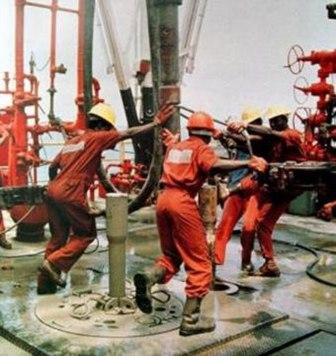As much as $2bn potentially in the maritime and logistics services in Nigeria, specifically in ship and oil rig repair awaits to be tapped into by foreign and indigenous investors, which would also generate a lot of employment.
Findings also show that in terms of revenue and job creation, one repair facility is capable of domesticating over $200 million annually, and generating about N12 billion in Customs duties, millions of dollars for the Nigerian Ports Authority (NPA) as dues collected from vessels and rigs that call the facility, as well as about 1,000 direct jobs. The nation has a rig capacity of upto 100 but one the highest rig count remains 75 achieved in the third quarter of 2008. Currently it is estimated that the rig count has dropped significantly to less than 30.
Given the potential of up to 100 rigs and the cost of fixing a rig grossing into million dollars and the fact that Nigeria stands as the hub of the West African maritime and oil market, the potential for the nations rig repair market could be valued at over $2 billion.
The market opportunities for this sector, they say, are yet to be optimally tapped into by both indigenous and foreign investors, due to skill gap and the growing insecurity in the nation’s waterways. To this end, the economy is suffering high capital flight due to a dearth of investment in building repair facilities.
The business provides massive opportunities for operators in the maritime industry, as well as for steel industries, insurance, and the growing unemployment market. In 2012, over 100 rigs with billions of dollars’ worth of business were taken out of Africa for repairs, which is a huge loss for the continent.
Further findings have shown that there are about three ship and oil rig repair facilities in the country; the Lagos Deep Offshore Logistics Base (LADOL), Nigerdock, and Integrated Logistics Services (INTELS).
Analysts say that the business as a key employment driver, has the potential to create about 10,000 direct jobs and 5,000 indirect job opportunities, in line with the Local Content Act. This is only if Nigeria as the hub of maritime business in the west coast of Africa can invest significantly in developing more ship and oil rig repair and maintenance facilities.
With the three running ship and rig repair facilities, the business has created room for manpower training, as the present operators in country have resorted to building training schools for this purpose.
Amy Jadesimi, managing director of LADOL, an indigenous logistics company that is into rig repairs, said there are huge untapped opportunities in the business.
According to her, Nigeria as the hub of maritime business, has the potential to repair ships and rigs operating in her waters and can attract ship and repair businesses from other maritime and oil producing countries in the West African region. Analysts predict that the region will have about 250 explorations for offshore oil mining by 2017.
The government, she said, needs to collaborate and encourage Nigerians by creating an enabling environment for more investors to develop and build more facilities in the country.
“If we have ten facilities in Lagos, Warri, Yenagoa, Port Harcourt, there will be so much that can happen in Nigeria in the area of logistics. All we need is enabling environment that encourages more people into the market.”
Eddy Wikina, former external affairs manager of Shell, confirmed that the repair yards in the country are not enough to carry out maintenance work on rigs in the country. “This is in spite of the huge market for it in the country and this has resulted to capital flight, as Nigerian jobs are exported to other countries abroad”.
He said that the non-passage of the Petroleum Industry Bill (PIB) is a major constraint that has been discouraging potential investors from such business. He however added that the development of more facilities could provide a lot of training opportunities for Nigerians that would want to build skills in rig maintenance and operation.
Abiodun Adesanya, managing director, Degeconek, also said that there are big opportunities for Nigerians in the rig repair business because of the need for oil exploration in Nigeria. He said the high tempo of exploration activities in the country would attract massive rig repair jobs for service providers.
Nwankwo Charles, managing director of NRG Drilling Rigs Nigeria Limited, who bemoaned the lack of sufficient manpower to work on rigs, said with appropriate training, Nigerians can maintain or operate rigs. “It is unfortunate that Nigerian polytechnics which are supposed to provide the platform for the manpower required, are not properly equipped to train the Nigerian students”. This is why most of the repair facilities in Nigeria today have resorted to establishing their own training academies, to bridge manpower gaps and create jobs.

